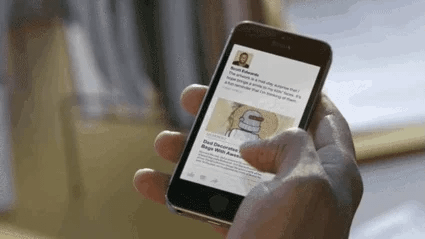How Social Media Is Taking Over Journalism and Broadcasting in Africa
59% of Nigerians turn to social media platforms for news updates. Facebook, the leading platform for news sharing, is used by 64% of respondents, demonstrating the growing dominance of social media.
The erosion of trust in traditional media has been stark in Africa, with many citizens increasingly relying on social media for their news. A 2023 report revealed that in Nigeria alone, traditional print media saw a 5% drop in weekly reach. Now, 59% of Nigerians turn to social media platforms for news updates. Facebook, the leading platform for news sharing, is used by 64% of respondents, demonstrating the growing dominance of social media over traditional print and broadcast media.
In fact, social media has not only become a channel for sharing news but also a crucial tool for disseminating information, especially in moments of political tension. For instance, during Kenya's 2022 elections, TikTok emerged as a central platform for sharing election-related news. As younger audiences increasingly turn away from traditional outlets, newsrooms are being forced to rethink how they engage with the next generation of media consumers.
Social Media as Africa’s New Newsroom
In Africa, mobile internet use is skyrocketing, with more than 520 million people now connected to the internet. Social media platforms like WhatsApp, X, Instagram, and TikTok have transformed from lifestyle-sharing spaces into vital hubs of information. Over 103 million Nigerians are now active internet users as of January 2024, and a significant portion of this population consumes news through their mobile devices.
Journalists, broadcasters, and media organizations are adapting to this new digital-first landscape. WhatsApp groups have become the first stop for breaking news, while platforms like X Spaces and Facebook Live allow for real-time news coverage and direct interaction with audiences. News organizations such as The Daily Nation in Kenya and Channels TV in Nigeria have embraced these platforms, creating engaging, digital-first content for their audiences.
The result is that social media has democratized the flow of information, breaking the monopoly that traditional media once held. No longer passive consumers, African audiences are now active participants in creating, sharing, and critiquing the news.
The Rise of Citizen Journalism
One of the most transformative effects of social media on journalism is the rise of citizen journalism. Armed with smartphones and access to social media, ordinary citizens can now report events as they unfold, bypassing traditional media gatekeepers. During crises, protests, or political events, platforms like Facebook, WhatsApp, and X become the go-to sources for real-time updates.
A vivid example is the #EndSARS movement in Nigeria, where social media was the frontline for reporting police brutality. Videos, photos, and eyewitness accounts circulated online, capturing global attention and forcing traditional media to follow the social media narrative. What started as grassroots reporting ultimately sparked a global movement, emphasizing the power of citizen journalism in Africa's digital age.
For Africa’s creative industry, this democratization of news offers opportunities for bloggers, influencers, and creators to act as independent news sources. The monopoly of traditional broadcasters is being challenged, with influencers often commanding larger audiences than legacy media outlets.
Social Media vs. Traditional Broadcasting: A Battle for Attention
Traditional broadcasters in Africa are facing unprecedented competition from social media platforms. While radio and television still hold sway, especially among older demographics, their audiences are increasingly fragmented. Younger, more tech-savvy Africans are turning to social media for faster, more interactive, and often more engaging content.
Platforms like Instagram, X, and TikTok offer real-time feedback and personalized experiences that traditional broadcasting struggles to match. However, broadcasters who adapt to this new reality are finding ways to thrive. Many are integrating social media into their reporting, using tools like Instagram Stories and Twitter trends to drive traffic to their platforms.
But it's not just broadcasters who are leveraging social media; influencers and content creators are monetizing these platforms, creating new revenue streams. South African media personality Bonang Matheba, for instance, has built a media empire through her massive social media following, blending news, entertainment, and lifestyle content.
This shift represents a fundamental change in how African audiences engage with news and content. For broadcasters, the rise of social media is both a challenge and an opportunity, offering new ways to reach audiences but also threatening traditional advertising models and viewer loyalty.
Challenges and Ethical Implications of the Shift
Despite the democratization of news, the rise of social media in journalism has brought new challenges, particularly concerning misinformation and disinformation. The rapid spread of information online often outpaces fact-checking processes, leading to the proliferation of fake news. This problem is especially pronounced in politically charged environments, where false information can incite violence or create widespread confusion.
During the COVID-19 pandemic, Africa, like many other parts of the world, experienced an "infodemic" as misinformation spread rapidly across WhatsApp and Facebook. The challenge for African journalists and broadcasters is not only to compete with the speed of social media but also to counter the deluge of false reports that flood the digital space.
Furthermore, social media platforms operate under business models that prioritize engagement, often at the expense of accuracy. This creates a challenging environment for traditional news organizations, which must navigate a landscape where algorithms, rather than journalistic integrity, often determine what news reaches the public.
A New Era for African Journalism
As more Africans gain access to smartphones and the internet, social media will continue to redefine journalism and broadcasting across the continent. From the rise of citizen journalism to the power of influencer-driven content, social media is transforming the way Africans engage with the news. This new era offers both opportunities and challenges, particularly for traditional broadcasters, who must adapt to survive.
The future of African journalism will be shaped by this ongoing interplay between social media and traditional media. For African creatives, journalists, and broadcasters, social media represents a dynamic, evolving space that can no longer be ignored. As the lines between content creator, journalist, and broadcaster continue to blur, Africa’s creative industry is poised to thrive in this new digital landscape.









